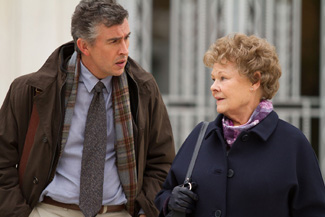If I Were an Academy Member...
By Edwin Davies
March 1, 2014
5) Captain Phillips
The weirdest thing about Captain Phillips' nomination for Best Picture is that the single strongest element of the film, Tom Hanks' performance, was completely ignored. There's lots to recommend the film apart from Hanks; it's a brutally efficient piece of storytelling, boasts a great performance from newcomer (and deserved Oscar-nominee) Barkhad Abdi, and like the best of Paul Greengrass' films it manages to weave pointed political commentary among its conventional thrills. But Hanks commands the film, and the way he conveys the character’s trauma at the end is probably the best single piece of acting he's done in his entire career. There's a reason why people talk about the film almost solely in terms of its ending, and it's just bizarre that the key factor in what makes the film great was completely left out in the cold.
4) Nebraska
Alexander Payne's film feels like an anomaly, even in such a varied year as this, because it's such a low-key comedy-drama that it's surprising to see it being recognized amongst far more audacious or traditionally Oscar-friendly films. It's completely deserving, though, since it's such a sweet, nuanced portrayal of a father-son relationship, and so beautifully captures a particularly small town form of melancholy that it'd be a shame if it had been completely overlooked. Reminiscent of Paper Moon, it tells a simple, straightforward story of two people going out on a journey together with wit, heart and more than a pinch of heartbreak as the son learns that his father is a more complicated man than he first imagined. Bruce Dern is as great as he ever is, but Will Forte gives as good as he gets, serving as co-lead of a story that is very much about how these two men at very different points in their lives come to relate to each other. June Squibb is also essential as one of the year's most surprisingly hilarious characters.
3) Gravity
Easily the most unforgettable cinematic experience of 2013, for me, was seeing Gravity in 3D (something I'm loath to do since I don't get on with the format) and being blown away by it. I've not revisited the film since on home media, partly because I'm worried that it won't hold up once I know how the story goes, but mainly because it's such a rare example of a purely theatrical experience that it feels almost wrong to consider it in any other context. It feels like a film that had to be seen on as big as screen as possible. Alfonso Cuarón created a blistering technical achievement, but what's really brilliant about it is the way that it melds form and content so viscerally. It's hard to imagine the story of Dr. Ryan Stone coming to terms with her grief being told in any other way and in any other format and having even one tenth of the impact that it does thanks to the exhilarating way Cuarón uses disaster movie tropes, but it's also hard to imagine the film being as exciting if the emotional component wasn't so well handled. A rare example of an effects-driven blockbuster that spends as much effort on the human component as on the damage unfurling around them.
2) The Wolf of Wall Street
For years now, I've said that Martin Scorsese hasn't made a truly essential film since Goodfellas. He's made plenty of good, interesting films in that time, but many of them are either flawed works that flirted with greatness (Bringing Out the Dead, Gangs of New York), pat genre exercises that allowed him some leeway to express himself (The Departed, Shutter Island) or Academy-courting efforts that were a little too dry to be genuinely interesting (The Aviator, Hugo). By returning to the Goodfellas model, but using it to investigate the lives of a different bunch of amoral creeps, Scorsese has finally made another great film. By turns riotously funny and deeply disturbing, Scorsese turns the story of Jordan Belfort into a full-blown, biting satire of corruption and greed, but in the end turns his focus on the audience for secretly (or, in some cases, not so secretly) wanting to be like Belfort, and society for failing to punish people like him who blew up the world economy only a few short years ago. An exhilarating, sadly necessary film.
1) Her
My personal favorite of the nominees, Spike Jonze's film manages a similar trick to Gravity in that it melds its technological innovations to a heartfelt story. The proportions are decidedly different, though, since Her is not a film defined by its technology, but by the messiness of its characters (although one of them is, in fact, a piece of software). None of the other films are as deeply felt and emotional resonant as Her, which not only explores how humans relate to each other through technology, but works as a heartbreaking metaphor for how people grow and change within a relationship, and how that sometimes results in people drifting apart through no fault of either party. It's a credit to Jonze as a writer-director and to Joaquin Phoenix and Scarlett Johansson as his leads that they make the idea of a man falling in love with his phone achingly real.
Continued:
1
2
|
|
|
|




